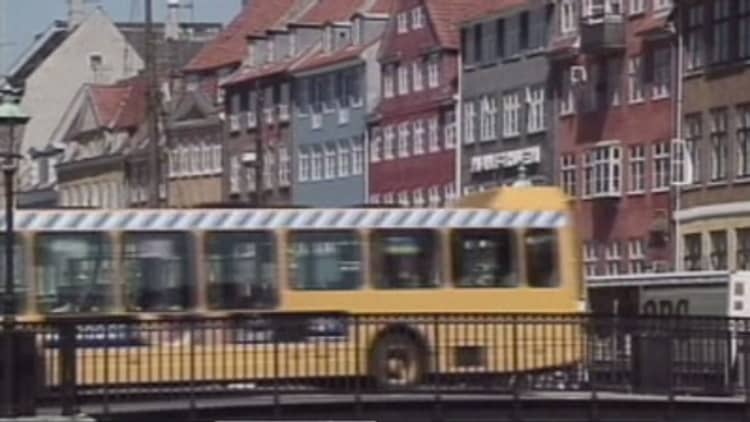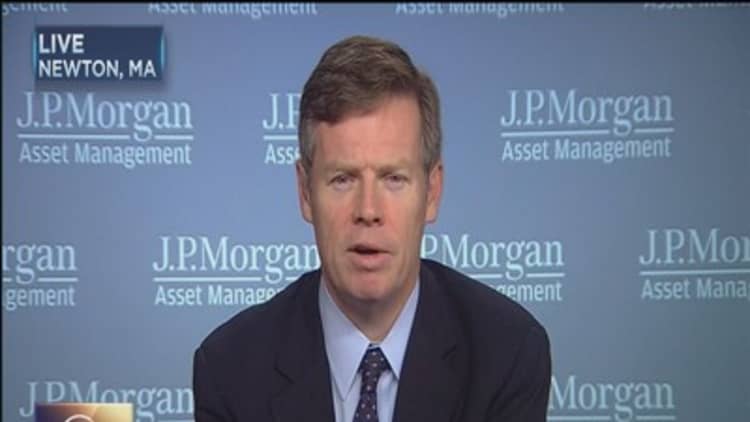
Denmark has imposed controls on its southern frontier with Germany in a move that is intended to stem the flow of migrants but will also deepen concerns about Europe's fraying commitment to the free movement of people.
Lars Lokke Rasmussen, Danish prime minister, said the decision was prompted by Sweden's move hours earlier to introduce identity checks for all passengers arriving by train, bus or ferry from Denmark.
"The new Swedish requirement for ID checks poses a serious risk of a large number of asylum seekers accumulating in a short time, for example in and around Copenhagen, threatening public order and safety. We do not want this," he said at a hastily called press conference on Monday.
The Danish controls are temporary and will last for the next 10 days but can be extended. Distinct from the Swedish measures, they will involve random checks and will not automatically require all cars and passengers crossing from Germany to show their passports. Mr Rasmussen said Angela Merkel, German chancellor, and the European Commission had been notified.
Nonetheless, the new controls — particularly the Swedish checks on passengers crossing the Oresund strait between Copenhagen and Malmo — illustrated how the migrant crisis is pushing up barriers and stirring tensions between even the closest European neighbours. They were denounced by politicians and commuters in the region.

Carl Bildt, former Swedish prime minister, called it "a dark day for our Nordic region". Michael Randropp, chairman of the Commuters Association representing the more than 10,000 daily bridge users, likened the controls to a new Berlin Wall or Iron Curtain.
Germany's foreign ministry said Schengen, Europe's passport-free travel zone, was "in danger".
Helena Sjolander, who commutes from Sweden to Denmark, said she might have to look for a new job because of the delays from the checks. "It is surreal. I never in my life thought that I would experience this," she said.
Sweden was long regarded as Europe's most generous country to asylum-seekers, offering permanent residence in recent years to Iraqis and then Syrians. But after a surge in the number of asylum seekers last year, Sweden's centre-left government buckled under pressure from local authorities and the public to crack down on immigration.
The ID checks do not apply to cars on the Oresund crossing, which features in the TV series The Bridge. Travel documents have seldom been needed between the two Nordic countries since a passport union was introduced in 1958.
The controls have stoked tensions between Sweden and Denmark, where the centre-right government and its centre-left predecessor have been critical of Stockholm's generous immigration policies.
Hans Christian Schmidt, Denmark's transport minister, said: "It is sad that Swedes have run a failed immigration policy which now means that they are forced to do this. It is sad and annoying for the whole region."
Mr Rasmussen was also critical, saying large sums of money have been spent marketing the Oresund area on both sides of the border as one region.
The anti-immigration Danish People's party that acts as the main support for Mr Rasmussen's government in parliament, has long called for border controls and celebrated their arrival.
"A step in the right direction . . . Schengen has collapsed. The illusion of external borders has burst. Why does it take such a long time to recognise this?" Kristian Thulesen Dahl, the party's leader, wrote on Facebook.
More from the Financial Times:
PAG raises $3.6bn for Asian buyout fund
The political shocks that will define 2016
Equities: And then there were nine
Sweden received 163,000 applications for asylum last year, double the number from 2014. Local authorities across the country — but particularly in the south, close to the Danish border — have complained that public services are under strain due to the arrival of so many asylum seekers.
Stefan Lofven, Sweden's prime minister, admitted the country had been "naive" about immigration when he announced curbs in November that restrict the right to family reunification and offer temporary rather than permanent residence.
If nothing else, the latest measures have succeeded at infuriating commuters. Nick Bean, who moved to Malmo four months ago to commute to Copenhagen for work, called the ID checks "totally pointless and totally insane", adding: "I can't help think that the Swedish government is trying to close the door after the horse has bolted."
Mr Bean said his commute on Monday morning to Copenhagen had gone relatively smoothly despite half the trains being cancelled but worried the controls would be worse on the journey home. "The people who will pay for this literally and metaphorically are the commuters," he added.



